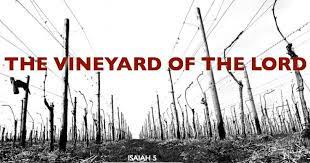Reflection: "Why, Why, Why?"The “5 Whys” is an iterative question-asking technique, used to explore the cause-and-effect relationships underlying a particular problem.
The primary goal of the technique is to determine the root cause of a problem. (The "5" comes from empirical observations on the number of iterations typically required to resolve the problem.) For example, let’s look at why the car won’t start. First Why (Why won’t the vehicle start)? - The battery is dead. Second Why (Why is the battery dead)? - The alternator is not functioning. Third Why (Why is the alternator not functioning)? - The alternator belt has broken. Fourth Why? (Why has the alternator belt has broken)? It was beyond its service life and had not been replaced. Fifth Why? (Why did that happen)? The vehicle was not maintained according to the recommended service schedule (the root cause). In today’s message, we’re only going to need 3 “why’s” (modern ministers must just be getting more efficient, because they now always have 3 points in their sermons, not 5). Looking at three of the readings set down in this week’s Revised Common Lectionary, we get a biblical perspective: Reading #1. Isaiah was a prophet living in the southern kingdom of Judah in the 8th century BC. The book of Isaiah is actually comprised of several collections of prophecies from various sources. It shares its perspective on history with the book of Deuteronomy. The catastrophes that befell Israel in 721BC (takeover by Assyrians) and Judah in 587BC (takeover by Babylonians), were caused by the faithlessness and ingratitude of the people toward God. This had shaped a faithless form of politics and a self-indulgent upper class, whose worship was coupled with an indifference to injustice. So, the people weakened their society and, consequently brought on their defeat by foreign nations. Isaiah 5:1-7 is often called the “Song of the Vineyard” and it depicts Israel as a vineyard, chosen by God, but which did not yield usable grapes. The people were not suitable for their intended purpose, because God expected justice, but instead saw bloodshed. Reading #2. Psalm 80 is a community lament, which was often sung in the context of a military defeat. Like Isaiah 5, it uses the metaphor of Israel as a vineyard. The psalmist laments that God has broken down the wall protecting the nation from their enemies and prays for God to “turn again” and work through “the one at your right hand” (King David) to bring them victory. Reading #3. Luke 12:49-56 records the words of Jesus to his disciples regarding the divisive nature of his teachings. While the psalmist in Psalm 80 implores God to “turn again,” Jesus urges listeners to “turn back to” God. It's interesting that this text is sandwiched between the parable of the faithful and the unfaithful slave (12:41-48) and the command to the Galileans to repent or perish (13:1-5), which is then followed by the parable of the barren fig tree (13:6-9). This placement sharpens the point of this story and gives it added urgency. The use of the word “division” may be seen as a sign of the presence of the Messiah in God’s kingdom. For Luke, the teachings of Jesus, in the context of his coming death, call for a decision that will trouble the waters of a settled life and call for action, rather than helping listeners fit into a comfortable society and smoothing the way in all their relationships. Now, to expand on the connecting thread that we notice when we study these readings. Each of the three texts contains a “why” question. In Isaiah 5:4, God asks the people a question, in which he challenges them to take responsibility for their situation. “What more was there to do for my vineyard that I have not done in it? When I expected it to yield grapes, why did it yield rotten grapes?” (NRSV version), or Why don’t you bear fruit when I’ve nurtured your growth for so long? (my version) In Psalm 80:12, the people ask God a question, in which they blame him for their misfortune. “Why then have you broken down its (ie. the vineyard’s) walls, so that all who pass along the way pluck its fruit?” (NRSV version), or Why do you allow us to suffer the consequences of our actions? (my version) In Luke 12:56, Jesus asks his disciples a question in which he challenges them to stop blaming God and start turning to God and repenting. “You know how to interpret the appearance of earth and sky, but why do you not know how to interpret this present time?” (NRSV version) Jesus asks us why we don’t see that now is the time to stop blaming God, start turning to God and start taking my teachings seriously? (my version) These three “why” questions are not just focused on us as individuals, but also on the communities in which we live and are actually quite theological in their nature. They have everything to do with sin, freewill and repentance, for individuals, as well as for communities. Why aren’t we bearing fruit? Why are we blaming God, or other people, for our situation instead? Why don’t we see that now is the time to repent and change our lives? Building a lesson around questions such as these, was something Jesus often did, as he liked to ask questions of hist followers. These weren’t just rhetorical questions, which don’t require an answer and are meant to make us think more about the situation, like: “How could I be so stupid?” Or even questions that have obvious answers, like: “Who is faithful to us in good times and bad?” Answer: “God!” Instead, Jesus often asked what scholars like to call “impossible questions.” These are questions that challenge the listener and make them think, because there are no straightforward answers. Questions like: “Who of you, by worrying, can add a single hour to your life, or one cubit to your height?” or “What does it profit a person to gain the world and lose his soul?” We can see, however, from the chosen readings, that the kinds of questions being asked of us today are not ones that are impossible to answer. But they certainly are ones that cause us to reflect on our present situation and think about the consequences of our actions, or inactions. They challenge us to “pull our socks up” and kick off a process of change in our lives that will see us bearing good fruit, not bad. I won’t try to fool you - this process may not be easy. It may even take a long time. But my question to you, today is: “Are you willing to give it a go?” And I’ll follow that up with another question: “If not………… why, why, why?” Pastor Rick “Let God kindle a fire within you for God’s radical and costly way of love. Stay true to the path, love without ceasing, though it hurts, though it costs, though it is hard. Know that God is with you, our divine source of love. Trust that God is with you always, our divine source of faith. Amen.”
1 Comment
Lena Beryl Blok
13/8/2022 08:50:29 am
Thank you Rick for another thought provoking and challenging message. I am guilty of asking "Why", instead we must put our trust in God.
Reply
Your comment will be posted after it is approved.
Leave a Reply. |
Pastor
|
LANE COVE
|
Worship Service:9:30am Sunday
© Lane Cove Uniting Church | 2020
|



 RSS Feed
RSS Feed